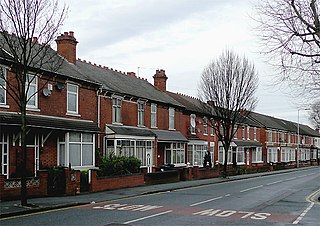
Renting, also known as hiring or letting, is an agreement where a payment is made for the temporary use of a good, service or property owned by another. A gross lease is when the tenant pays a flat rental amount and the landlord pays for all property charges regularly incurred by the ownership. An example of renting is equipment rental. Renting can be an example of the sharing economy.
Imputed rent is the rental price an individual would pay for an asset they own. The concept applies to any capital good, but it is most commonly used in housing markets to measure the rent homeowners would pay for a housing unit equivalent to the one they own. Imputing housing rent is necessary to measure economic activity in national accounts. Because asset owners do not pay rent, owners' imputed rent must be measured indirectly.

A landlord is the owner of a house, apartment, condominium, land, or real estate which is rented or leased to an individual or business, who is called a tenant. When a juristic person is in this position, the term landlord is used. Other terms include lessor and owner. The term landlady may be used for the female owners. The manager of a pub in the United Kingdom, strictly speaking a licensed victualler, is referred to as the landlord/landlady. In political economy it refers to the owner of natural resources alone from which an economic rent is the income received.

Eviction is the removal of a tenant from rental property by the landlord. In some jurisdictions it may also involve the removal of persons from premises that were foreclosed by a mortgagee.

A lease is a contractual arrangement calling for the user to pay the owner for the use of an asset. Property, buildings and vehicles are common assets that are leased. Industrial or business equipment are also leased. Basically a lease agreement is a contract between two parties: the lessor and the lessee. The lessor is the legal owner of the asset, while the lessee obtains the right to use the asset in return for regular rental payments. The lessee also agrees to abide by various conditions regarding their use of the property or equipment. For example, a person leasing a car may agree to the condition that the car will only be used for personal use.

A model village is a type of mostly self-contained community, built from the late 18th century onwards by landowners and business magnates to house their workers. Although the villages are located close to the workplace, they are generally physically separated from them and often consist of relatively high-quality housing, with integrated community amenities and attractive physical environments. "Model" is used in the sense of an ideal to which other developments could aspire.
Subsidized housing is government sponsored economic assistance aimed towards alleviating housing costs and expenses for impoverished people with low to moderate incomes. In the United States, subsidized housing is often called "affordable housing". Forms of subsidies include direct housing subsidies, non-profit housing, public housing, rent supplements/vouchers, and some forms of co-operative and private sector housing. According to some sources, increasing access to housing may contribute to lower poverty rates.
Buy-to-let is a British phrase referring to the purchase of a property specifically to let out, that is to rent it out. A buy-to-let mortgage is a mortgage loan specifically designed for this purpose. Buy-to-let properties are usually residential but the term also encompasses student property investments and hotel room investments.
Housing Benefit is a means-tested social security benefit in the United Kingdom that is intended to help meet housing costs for rented accommodation. It is the second biggest item in the Department for Work and Pensions' budget after the state pension, totalling £23.8 billion in 2013–14.
The private rented sector (PRS) is a classification of United Kingdom housing tenure as described by the Ministry of Housing, Communities and Local Government, a UK government department that monitors the national housing supply.

A house in multiple occupation (HMO), or a house of multiple occupancy, is a British English term which refers to residential properties where ‘common areas’ exist and are shared by more than one household.
A slumlord is a slang term for a landlord, generally an absentee landlord with more than one property, who attempts to maximize profit by minimizing spending on property maintenance, often in deteriorating neighborhoods, and to tenants that they can intimidate. Severe housing shortages allow slumlords to charge higher rents, and when they can get away with it, to break rental laws.

Home ownership in Australia is considered a key cultural icon, and part of the Australian tradition known as the Great Australian Dream of "owning a detached house on a fenced block of land." Home ownership has been seen as creating a responsible citizenry; according to a former Premier of Victoria: "The home owner feels that he has a stake in the country, and that he has something worth working for, living for, fighting for."
For United States commercial real estate, normally the landlord, rather than the tenant, is responsible for real estate taxes, maintenance, and insurance. In a "net lease," in addition to base rent, the tenant or lessee is responsible for paying, some or all of the recoverable expenses related to real-estate ownership. As the rent collected under a net lease is "net" after expenses are passed through to tenants to be paid, the rent tends to be lower than rent charged under a gross lease.

The Welfare Reform Act 2012 is an Act of Parliament in the United Kingdom which makes changes to the rules concerning a number of benefits offered within the British social security system. It was enacted by the Parliament of the United Kingdom on 8 March 2012.
The under-occupancy penalty results from a provision of the British Welfare Reform Act 2012 whereby tenants living in public housing with rooms deemed "spare" face a reduction in Housing Benefit, resulting in them being obliged to fund this reduction from their incomes or to face rent arrears and potential eviction by their landlord.
Yiannakis Theophani "John" Christodoulou is a Monaco-based British billionaire property developer, the owner of Yianis Group, a privately held company with a portfolio of residential, hotel, retail and leisure properties in the UK and Europe. His Yianis Group employs over 7,000 people in the UK alone. As of May 2021, Christodoulou's estimated net worth is £2.35 billion. Through Yianis Group, Christodoulou is reportedly one of England's biggest freeholder landlords.

Housing in the United Kingdom represents the largest non-financial asset class in the UK; its overall net value passed the £5 trillion mark in 2014. About 30% of homes are owned outright by their occupants, and a further 40% are owner-occupied on a mortgage. About 18% are social housing of some kind, and the remaining 12% are privately rented.
A Rent Repayment Order (RRO) is an order in the United Kingdom that allows a tenant or local authority to reclaim rent or housing benefit where a landlord rents out an unlicensed property such as a House in multiple occupation (HMO).

The Warner Estate is an area of housing in Walthamstow and Highams Park, Waltham Forest in East London. The area was developed by Thomas Courtenay Warner and the Warner Company.










